The NVIDIA GeForce GTX 780 Ti Review
by Ryan Smith on November 7, 2013 9:01 AM ESTCompute
Jumping into compute, we’re entering the one area where GTX 780 Ti’s rule won’t be nearly as absolute. Among NVIDIA cards its single precision performance will be unchallenged, but the artificial double precision performance limitation as compared to the compute-focused GTX Titan means that GTX 780 Ti will still lose to GTX Titan whenever double precision comes into play. Alternatively, GTX 780 Ti still has to deal with the fact that AMD’s cards have shown themselves to be far more competitive in our selection of compute benchmarks.
As always we'll start with our DirectCompute game example, Civilization V, which uses DirectCompute to decompress textures on the fly. Civ V includes a sub-benchmark that exclusively tests the speed of their texture decompression algorithm by repeatedly decompressing the textures required for one of the game’s leader scenes. While DirectCompute is used in many games, this is one of the only games with a benchmark that can isolate the use of DirectCompute and its resulting performance.
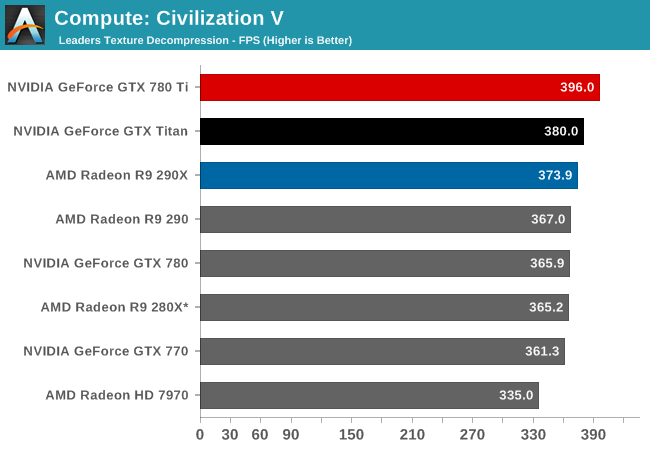
Even though we’re largely CPU bound by this point, GTX 780 Ti manages to get a bit more out of Civilization V’s texture decode routine, pushing it to the top of the charts and ahead of both GTX Titan and 290X.
Our next benchmark is LuxMark2.0, the official benchmark of SmallLuxGPU 2.0. SmallLuxGPU is an OpenCL accelerated ray tracer that is part of the larger LuxRender suite. Ray tracing has become a stronghold for GPUs in recent years as ray tracing maps well to GPU pipelines, allowing artists to render scenes much more quickly than with CPUs alone.
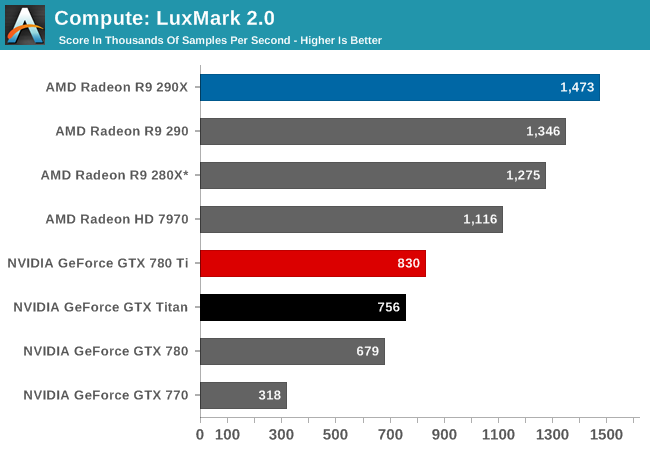
With LuxMark NVIDIA’s ray tracing performance sees further improvements due to the additional compute resources at hand. But NVIDIA still doesn’t fare well here, with the GTX 780 Ti falling behind all of our AMD cards in this test.
Our 3rd compute benchmark is Sony Vegas Pro 12, an OpenGL and OpenCL video editing and authoring package. Vegas can use GPUs in a few different ways, the primary uses being to accelerate the video effects and compositing process itself, and in the video encoding step. With video encoding being increasingly offloaded to dedicated DSPs these days we’re focusing on the editing and compositing process, rendering to a low CPU overhead format (XDCAM EX). This specific test comes from Sony, and measures how long it takes to render a video.
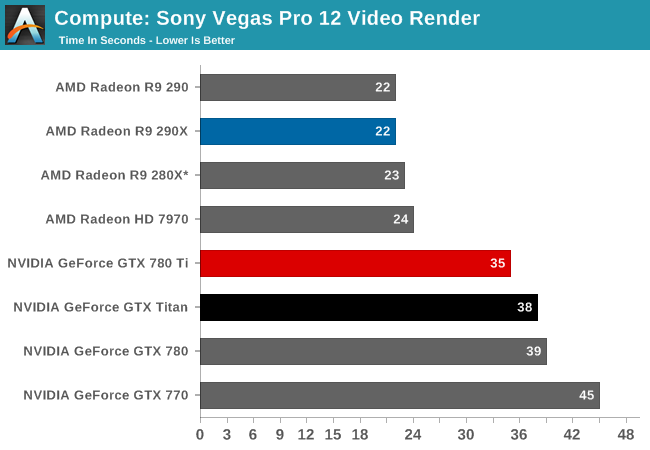
Like LuxMark, GTX 780 Ti once again improves on its predecessors. But it’s not enough to make up for AMD’s innate performance advantage in this benchmark, leading to GTX 780 Ti trailing all of the AMD cards.
Our 4th benchmark set comes from CLBenchmark 1.1. CLBenchmark contains a number of subtests; we’re focusing on the most practical of them, the computer vision test and the fluid simulation test. The former being a useful proxy for computer imaging tasks where systems are required to parse images and identify features (e.g. humans), while fluid simulations are common in professional graphics work and games alike.
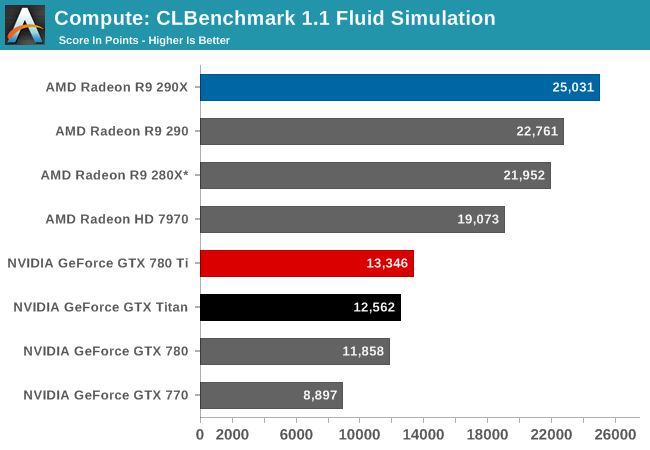
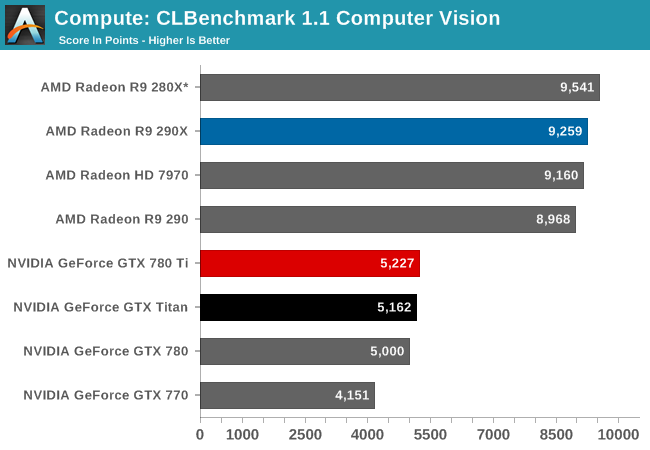
CLBenchmark continues to be the same story. GTX 780 Ti improves on NVIDIA’s performance to become their fastest single precision card, but it still falls short of every AMD card in these tests.
Moving on, our 5th compute benchmark is FAHBench, the official Folding @ Home benchmark. Folding @ Home is the popular Stanford-backed research and distributed computing initiative that has work distributed to millions of volunteer computers over the internet, each of which is responsible for a tiny slice of a protein folding simulation. FAHBench can test both single precision and double precision floating point performance, with single precision being the most useful metric for most consumer cards due to their low double precision performance. Each precision has two modes, explicit and implicit, the difference being whether water atoms are included in the simulation, which adds quite a bit of work and overhead. This is another OpenCL test, as Folding @ Home has moved exclusively to OpenCL this year with FAHCore 17.
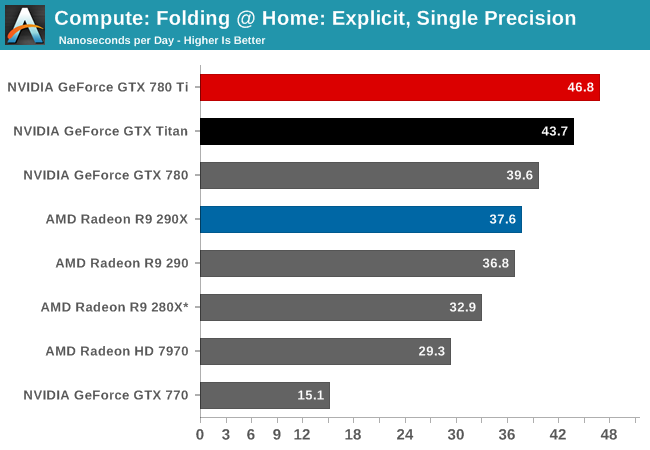
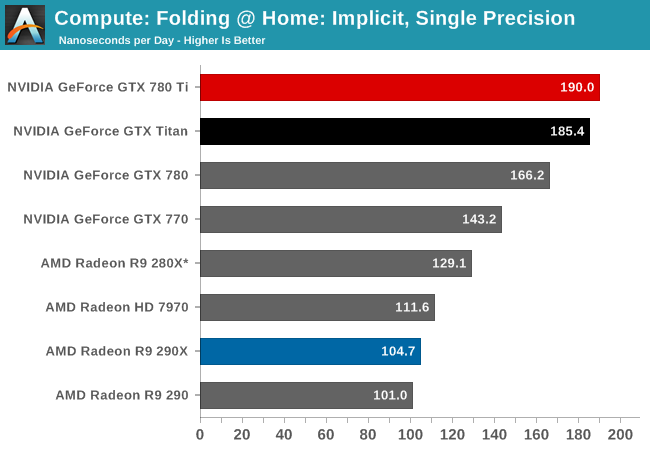
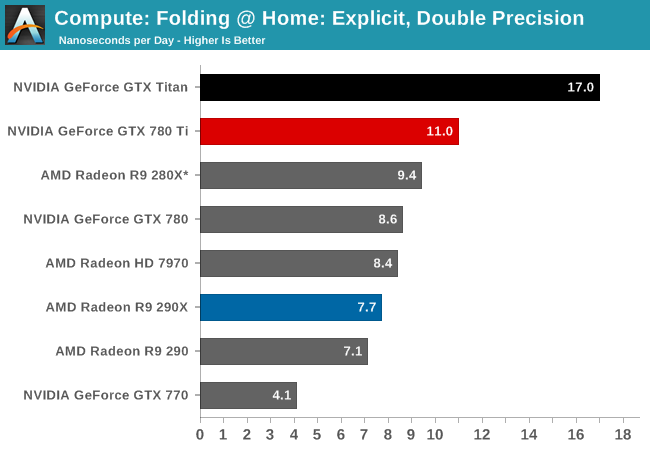
Finally with Folding@Home we see the GTX 780 Ti once again take the top spot. In the single precision tests the GTX 780 further extends NVIDIA’s lead, beating GTX Titan by anywhere between a few percent to over ten percent depending on which specific test we’re looking at. However even with GTX 780 Ti’s general performance increase, in the double precision test it won’t overcome the innate double precision performance deficit it faces versus GTX Titan. When it comes to double precision compute, Titan remains king.
Wrapping things up, our final compute benchmark is an in-house project developed by our very own Dr. Ian Cutress. SystemCompute is our first C++ AMP benchmark, utilizing Microsoft’s simple C++ extensions to allow the easy use of GPU computing in C++ programs. SystemCompute in turn is a collection of benchmarks for several different fundamental compute algorithms, as described in this previous article, with the final score represented in points. DirectCompute is the compute backend for C++ AMP on Windows, so this forms our other DirectCompute test.
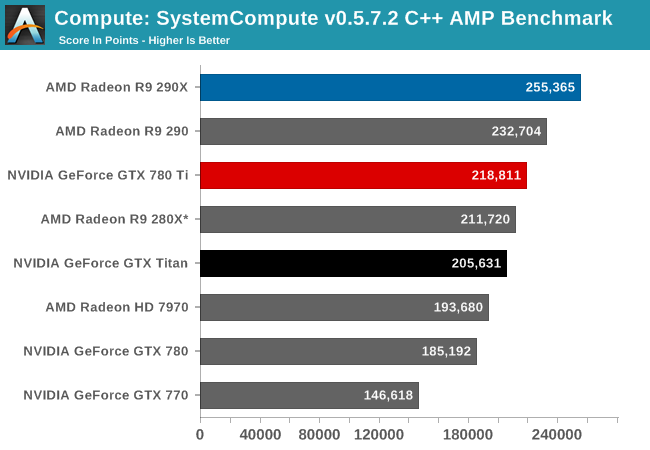
Last, in our C++ AMP benchmark we see the GTX 780 Ti take the top spot for an NVIDIA card, but like so many of our earlier compute tests it will come up short versus AMD’s best cards. This isn’t quite as lopsided as some of our other tests, however GTX 780 Ti is stuck competing with the 280X while the 290 and 290X easily outperform NVIDIA’s new flagship.










302 Comments
View All Comments
bronopoly - Thursday, November 7, 2013 - link
Who plays at 60 fps? Surely not people playing games competitively.Tetracycloide - Thursday, November 7, 2013 - link
They don't include 1080p because they assumed no one would be stupid enough to buy a $700 card for 1080p gaming. I guess you showed them...Ryan Smith - Thursday, November 7, 2013 - link
We actually have the 1080p data, however we didn't publish it since it's not a resolution we're really expecting this card to be used with. When GPU Bench 14 goes live, that data will be available alongside everything else.bronopoly - Thursday, November 7, 2013 - link
I need 120 fps for my games when I'm using lightboost or 144 fps when I'm not using it. A lot of people aren't satisfied with 60 fps on good settings. When I go from a high framerate to something as awful as 60 fps, I usually restart my computer because I think something is wrong.Mondozai - Thursday, November 7, 2013 - link
The vast majority of people play at 60 fps. Including most people buying a high-end card. And the move is towards 4K over the next few years. You'll probably be stuck at 1080p for a long time if you insist on 120-144 fps while we will get 4K monitors next year for relatively affordable prices and even more so in 2015.That's your right. But cards like these are not going to be tailored towards people who want as high a fps as possible as opposed to as high a graphics fidelity as possible where 60 fps is the acceptable threshold. You can whine and bitch about it as much as you want. Won't make a difference.
HisDivineOrder - Thursday, November 7, 2013 - link
Where are these "properly-cooled 'GHZ' Editions of the R290X?" If they existed, you might have an argument, but they don't. So talk about what exists.Even HardOCP--between ignoring the ear-piercing sound of the 290X at 55% fanspeed--admitted they had seen and heard nothing of custom coolers for the R9 290/290X yet and that doesn't bode well.
So if you're waiting for a custom cooler to show up and save the R9 series, it looks like they're far, far away...
Tetracycloide - Thursday, November 7, 2013 - link
"Let's all pretend we suffer from a crippling lack of foresight!"OverclockedCeleron - Thursday, November 7, 2013 - link
1) Everyone knows what comes after a GPU announcement [hint: an avalanche of custom GPUs based on that GPU].2) Many reviewing sites have said that AMD is preventing their partners from producing custom R290X gpus until 780 Ti is released. Can you guess why ;-)?
bronopoly - Thursday, November 7, 2013 - link
Can I just make stuff up too?3) Insert wild speculation and conspiracy
Mondozai - Thursday, November 7, 2013 - link
Someone's got an NV card and wants to defend it to death :D